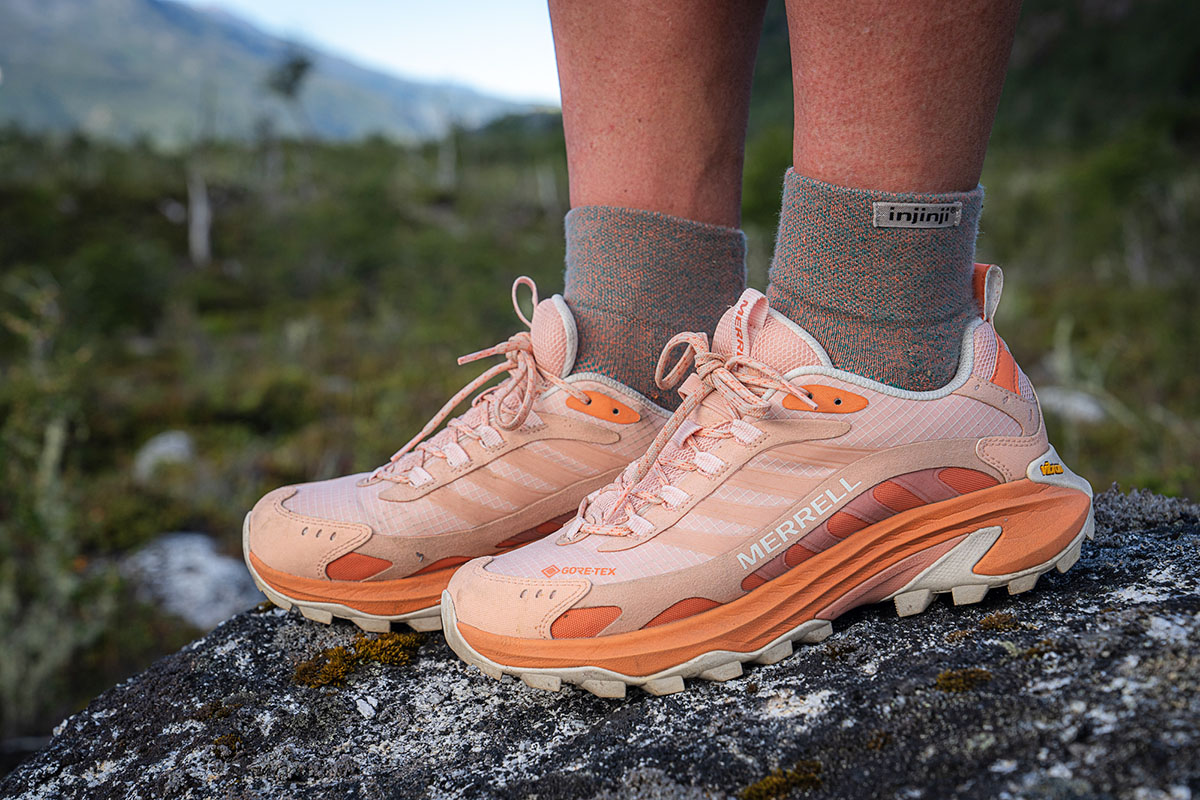
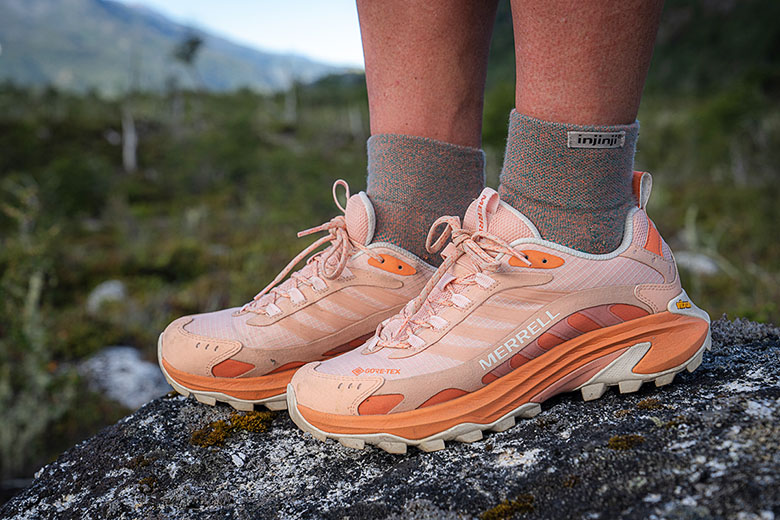
Price: $170
Weight: 1 lb. 6.8 oz. (women’s size 9)
Waterproof: Yes (Gore-Tex)
What we like: Checks all the boxes we look for in a well-rounded hiking shoe.
What we don’t: Roomy toe box and lack of secure heel resulted in a slightly sloppy feel—not ideal for covering steep and technical terrain.
See the Women's Moab Speed 2 GTX See the Men's Moab Speed 2 GTX
The Merrell Moab is a staple on trails across the country, and the aptly named Speed takes the winning design and trims it down for quick-moving day hikes and other lightweight adventures. We recently took the updated “2” to Chilean Patagonia for testing, where it proved to be impressively capable and versatile. The roomy toe box and lack of security at the heel did result in some sloppiness—the shoes wouldn’t be our first choice for particularly technical objectives—but the mix of comfort, stability, protection, and traction is hard to beat for on-trail adventures. Below we outline our experiences with the Moab Speed 2 GTX. To see how it stacks up to the competition, check out our articles on the best women’s hiking shoes and best hiking shoes.
Out of the box, the Merrell Moab Speed 2 GTX hits a real sweet spot in terms of comfort. For starters, the midsole strikes a nice balance between cushion and structure, offering enough underfoot support for covering technical ground without feeling overly stiff. (Importantly, the latest “2” uses 30% more foam than its predecessor, resulting in a noticeably cushier and less rigid feel.) The nylon upper is also nice and flexible, and there’s ample padding around the collar. My first true test with the shoes came during a trip up Cerro Nani, a Chilean peak that ascends about 5,000 vertical feet in under five miles. By the end of the day, I had suffered no hot spots or pressure points, and the shoes have fared equally well on subsequent outings. It’s true that the Moab Speed is at the softer end of the spectrum, and the toe box is noticeably roomy, both of which are downsides for navigating tricky terrain. But for hikers who stick to the trail, the all-day comfort is a real highlight.
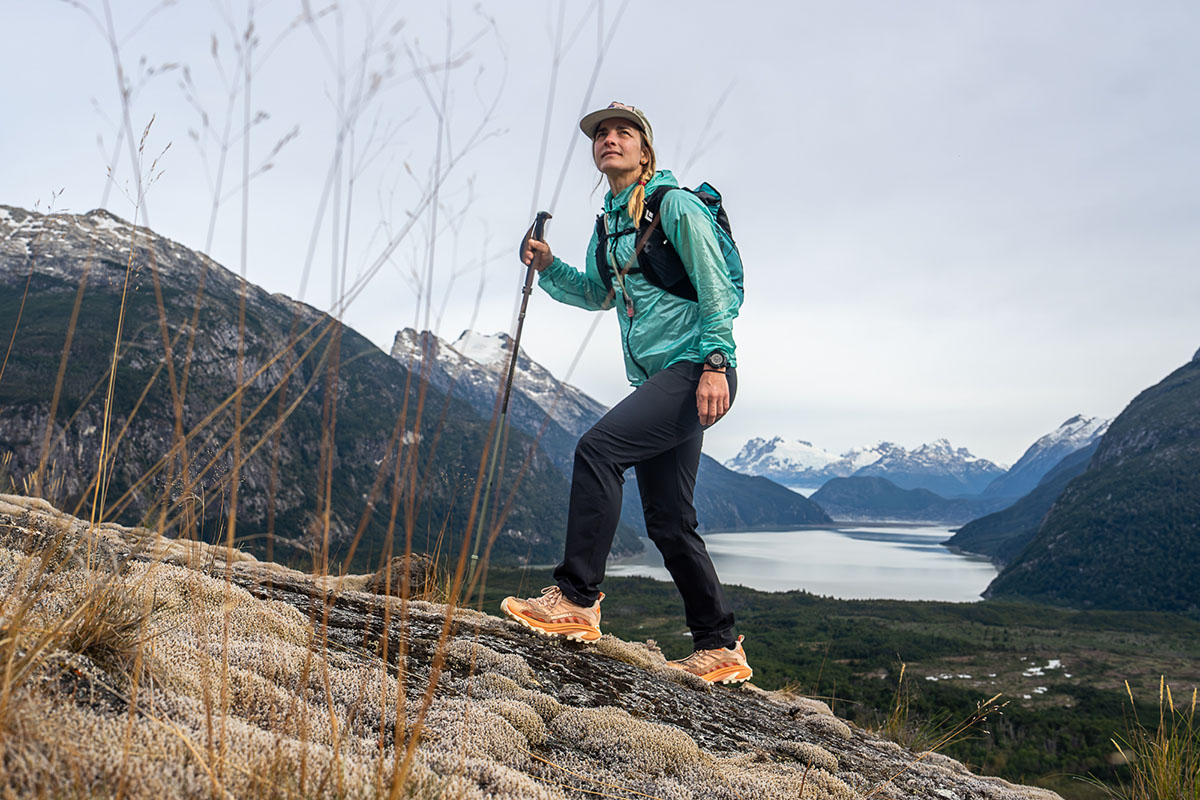
At 1 pound 6.8 ounces for my pair in a women’s size 9 (they’re listed at 1 lb. 5.2 oz.), the Moab Speed 2 GTX is pretty average in the wider hiking shoe market. For reference, they’re on par with or lighter than popular alternatives including Merrell’s own Moab 3 GTX (1 lb. 9.9 oz.), Salomon’s X Ultra 4 GTX (1 lb. 6.1 oz.), and Hoka’s Anacapa 2 Low GTX (1 lb. 8.8 oz.) while checking in heavier than hiking-friendly—but much less supportive—trail runners like the Hoka Speedgoat 5 (1 lb. 1 oz.) and Altra Lone Peak 7 (1 lb. 2.4 oz.). In the end, the Moab Speed lands in a really desirable spot for many hikers: It's light and nimble enough to cover ground quickly but with enough heft to confidently forge through loose and off-camber terrain.
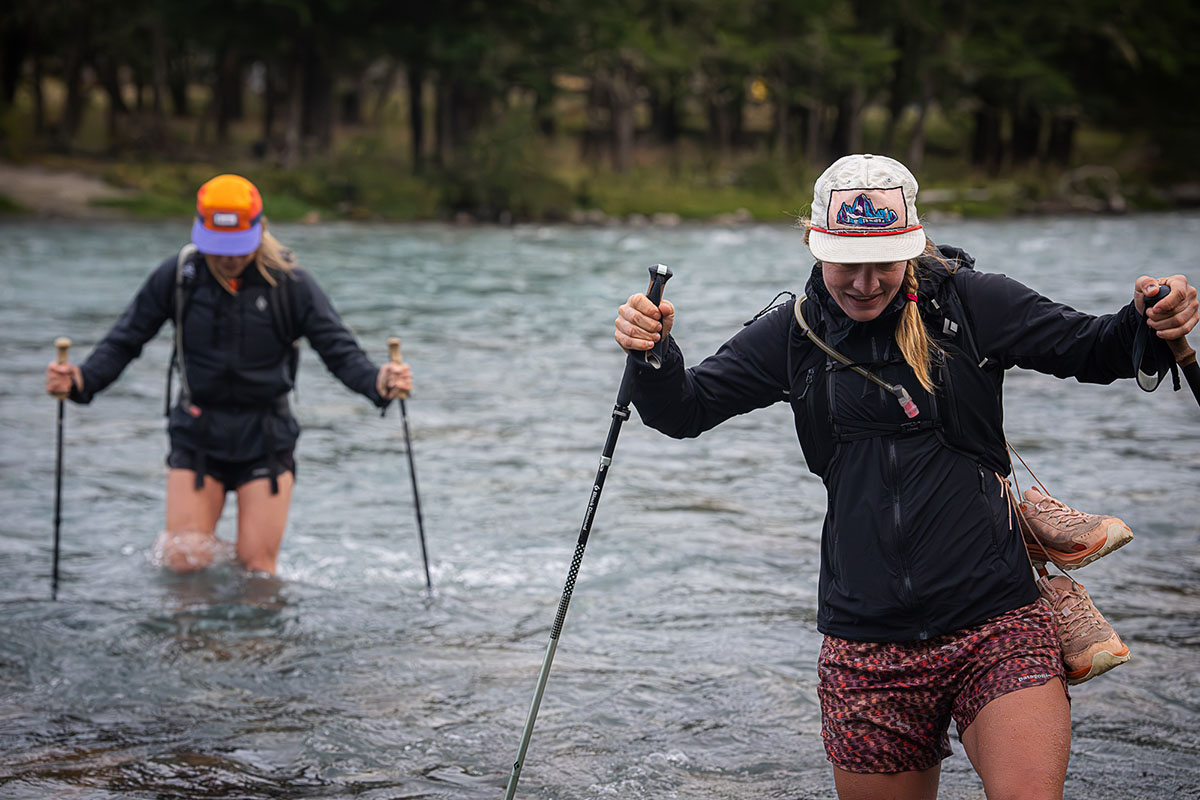
A key component to a well-rounded hiking shoe, traction is another strong suit for the Moab Speed. In this case, Merrell opted for a proven Vibram outsole with closely spaced, fairly aggressive (4mm) lugs that did a great job biting into soft terrain like loose gravel and thick moss. The only time the shoes faltered was on steep rock slabs, but this had more to do with the sloppy fit (more in “Fit and Sizing” below) than the outsole design. Otherwise, the Moab Speed performed flawlessly on everything from hardpacked trail to lichen-covered boulders.
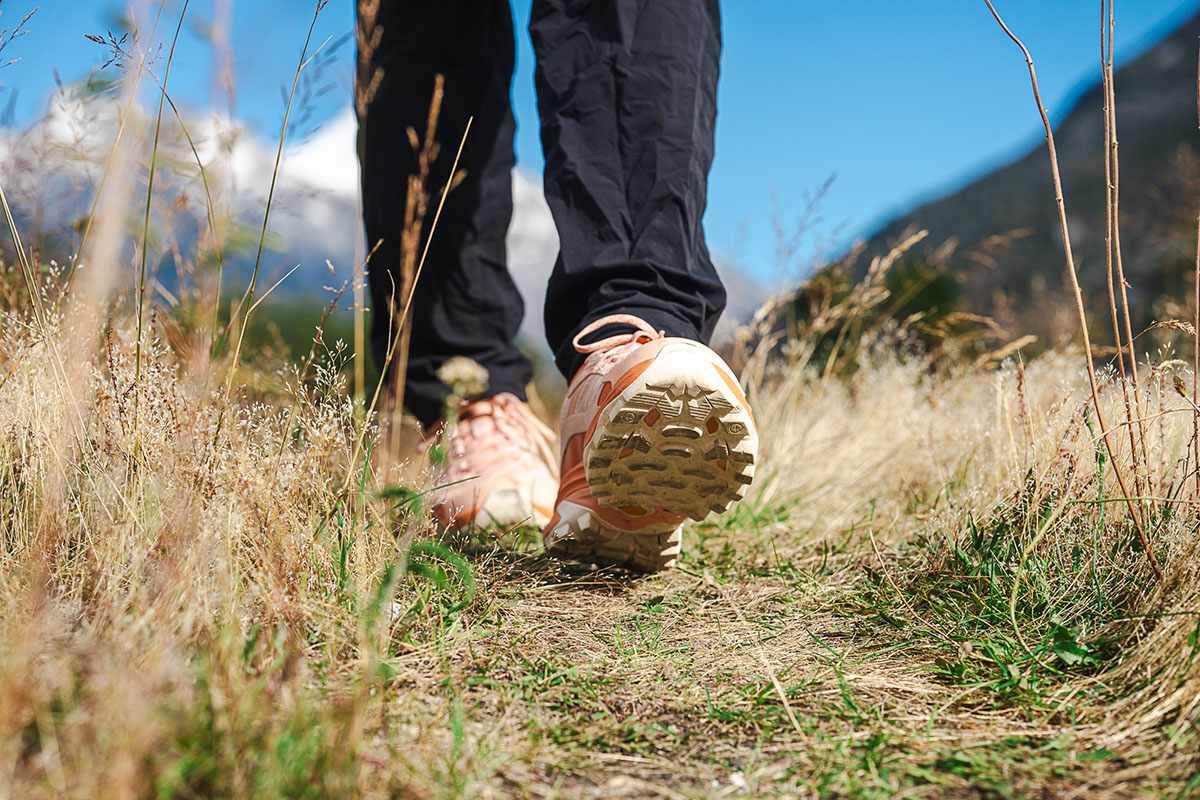
The Moab Speed 2 GTX is impressively stable and supportive for a low-top design—closer in feel to a substantial hiking boot than a flexible trail runner. Underfoot, the brand’s patented FlexPlate technology—an ultralight plate designed to increase rigidity and stability—does a good job providing structure and firmness without detracting from the shoes’ plush and well-padded feel. I did suffer a few ankle rolls on Cerro Nani but came away overall impressed by their ability to trudge through loose and off-camber terrain with ease. By contrast, I wore a pair of lightweight trail runners the next day and felt noticeably less stable and more vulnerable to ankle rolls. It’s worth noting that the shoes have a pretty tall stack height (34mm at the heel and 24mm at the forefoot), which some hikers may not like, but I never felt tippy or off-balance and enjoyed the isolation from the trail.
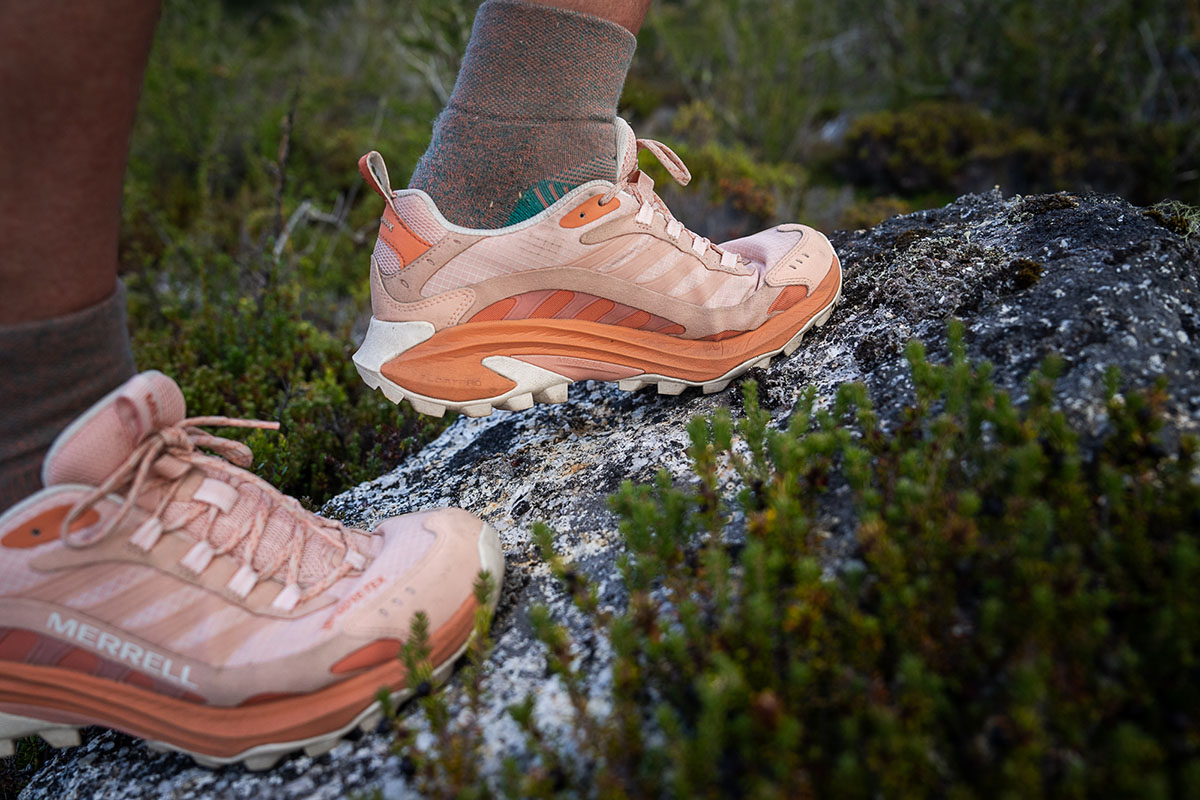
Gore-Tex is the gold standard when it comes to waterproofing, and the Moab Speed 2 GTX fared predictably well in the wet. Protection was limited due to the shoes’ low cut (Merrell does make a mid-height version for $10 more), but they performed flawlessly in shallow river crossings and when hiking through swampy patches off-trail. My only protection-related complaint is that the gap between the tongue and upper made it easy for debris to enter, even when I laced the shoes tightly.
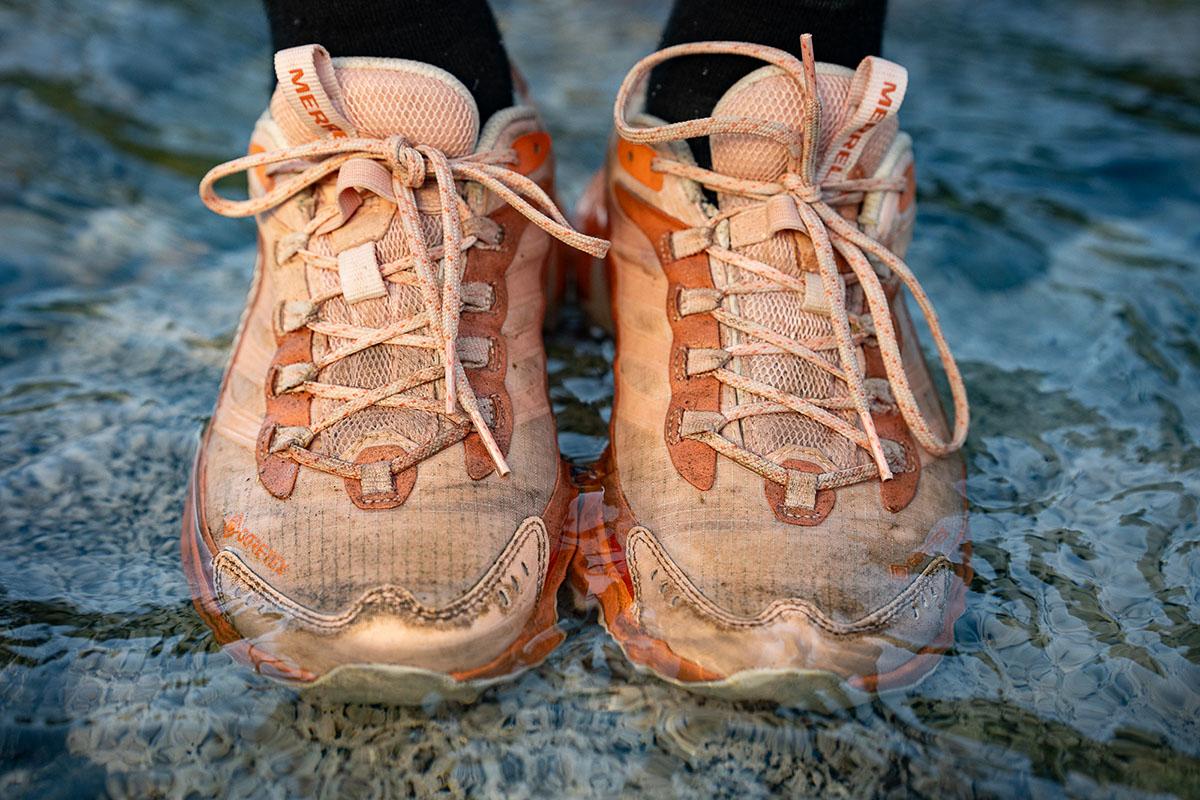
Unfortunately, the shoes' waterproof membrane doesn’t bode well for breathability or drying time (non-waterproof shoes typically breathe better and dry quicker). The protective TPU layer along the upper further detracts from ventilation. In the end, my advice would be to either opt for the non-waterproof Speed 2 ($140) or go with the full-height boot if you plan to utilize the Gore-Tex membrane. For more on the topic, check out our article: Do You Need Waterproof Hiking Shoes?
Merrell is a hiking shoe specialist, so it comes as little surprise that the Moab Speed 2 GTX is a quality and well-built design. The heel and toe caps are noticeably substantial and protective, the ripstop nylon upper boasts TPU overlays for added abrasion resistance, and the outsole is thick and clearly made to last. For reference, our ascent of Cerro Nani involved terrain that was definitely pushing the Moab Speed’s limits—including loose patches of dirt and gravel, lots of boulder hopping, wading through sharp bushes, and even snow at the peak—and the shoes came away looking largely unscathed, apart from some cosmetic scrapes and stains. I’ll need more time to evaluate the shoes’ long-term durability (and will follow up here if any issues arise), but all signs point to the Moab Speed 2 being a worthwhile investment.
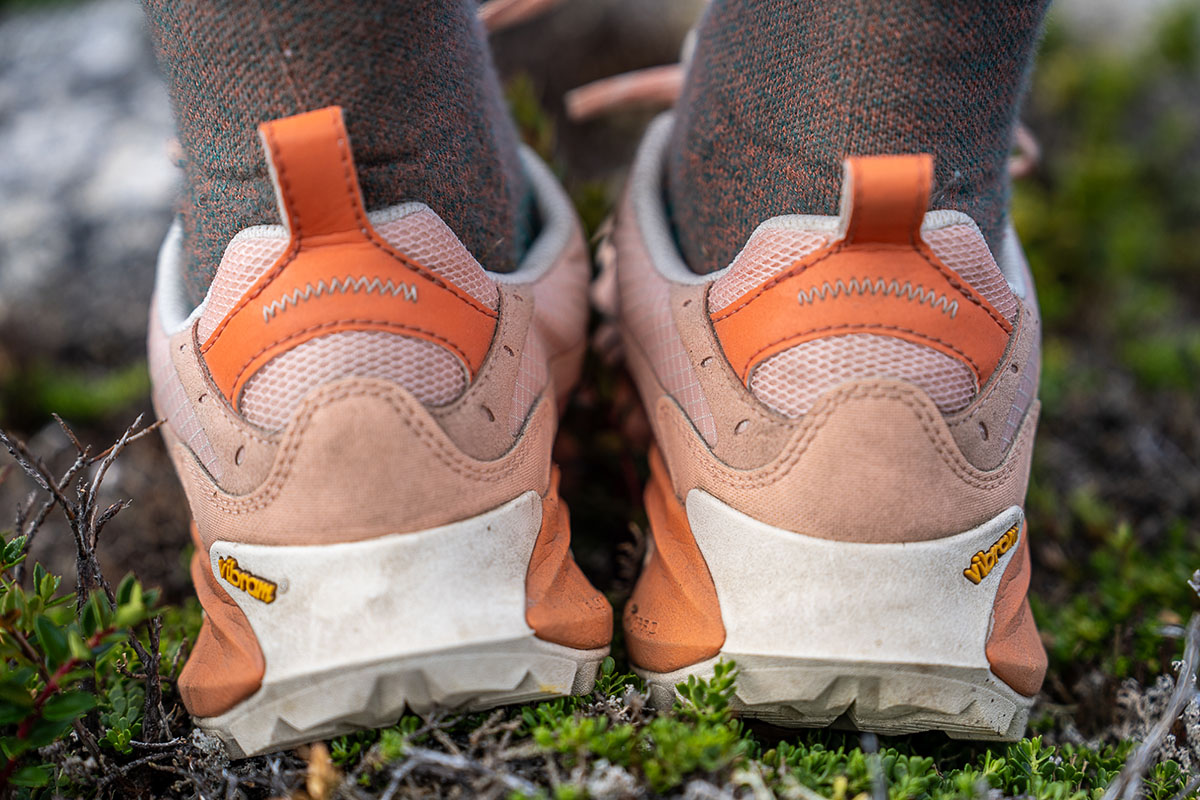
I’m usually between an 8.5 and 9 in women’s hiking shoes and opted for a size 9 in the Moab Speed. However, while the shoes fit lengthwise (confirming my size selection), the wide toe box and lack of security at the heel resulted in a slightly sloppy feel. In other words, if you prefer a snug and performance-oriented fit, the Moab Speed will likely disappoint. However, if all-day comfort is a bigger priority for you—like it is for many hikers—then the Merrell's more accommodating shape could be worth the drop in precision. A final note: Merrell offers the shoes in dedicated wide sizes, although given my experiences, I’d advise trying them on before you buy to ensure you truly need the additional room.
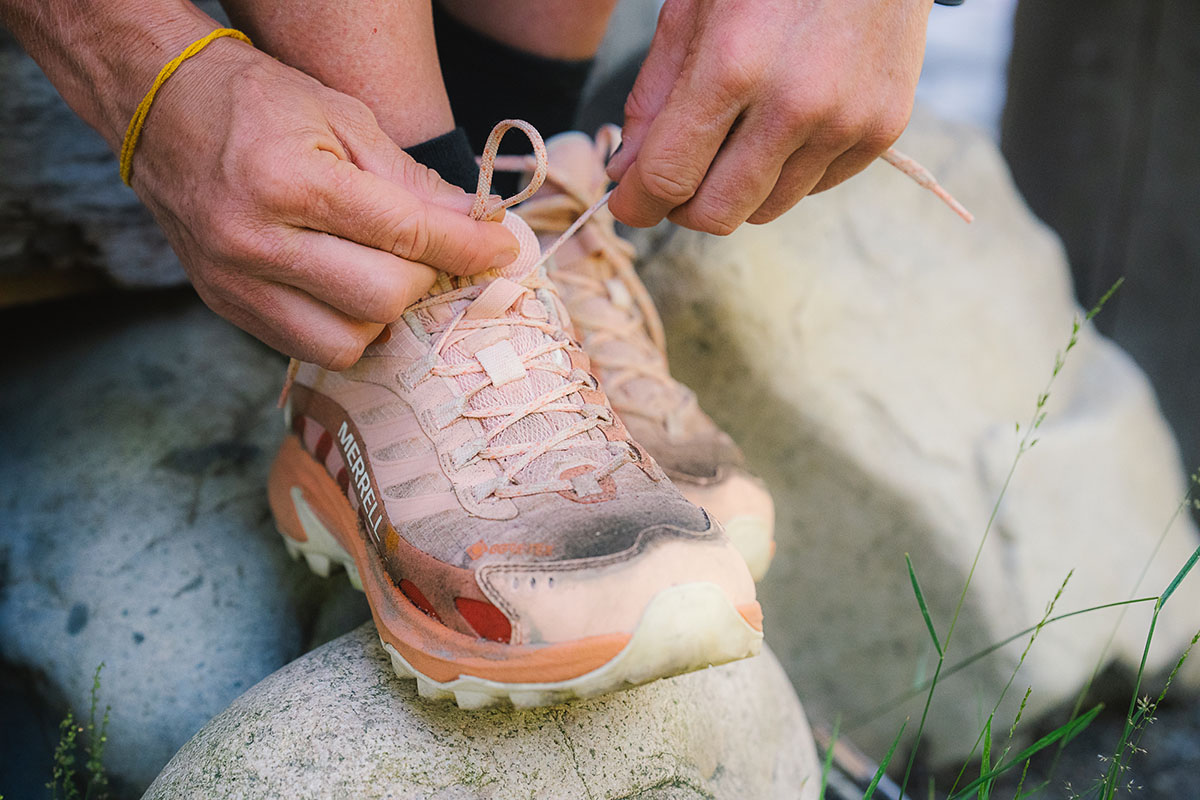
Like many leading outdoor brands, Merrell is taking steps to improve their environmental impact, from reducing plastic packaging to incorporating more eco-friendly materials in their products. The Moab Speed 2 GTX is a case in point: The shoes’ mesh lining, mesh footbed cover, and shoelaces are made of 100%-recycled materials, while the EVA foam insole is 50% recycled. It’s worth noting that the latest version forgoes the Vibram Ecostep outsole featured on the original iteration, which was made from 30%-recycled rubber, but it’s a solid effort overall.
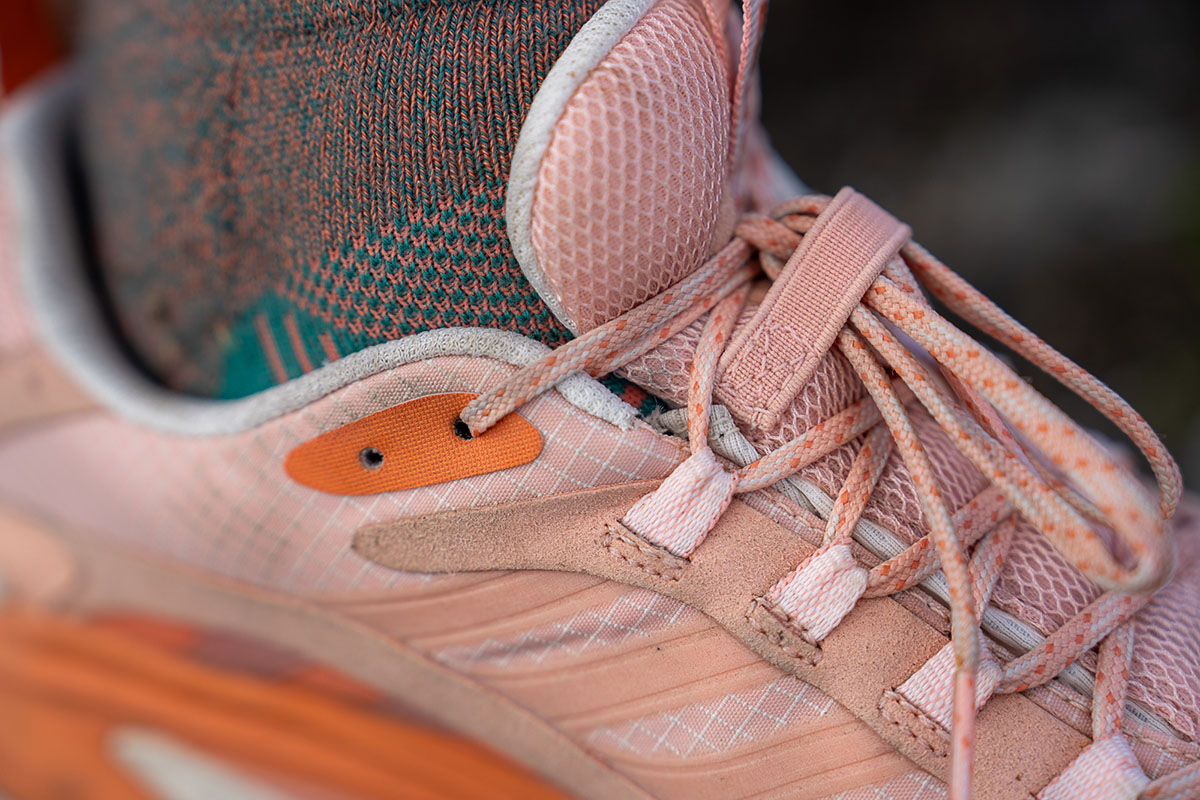
We tested the women’s Moab Speed 2 GTX for this review, and the men’s model is largely similar. Primary differences include a slightly heavier weight (1 lb. 8.7 oz. per pair) and different colorway options, but the two designs are otherwise very comparable. Zooming out to the wider Moab Speed lineup, the mid-height Moab Speed 2 Mid GTX adds over-the-ankle coverage and support for $10 more than the low-top. And for those who don’t need or want waterproofing, the non-waterproof Moab Speed is lighter (1 lb. 3.4 oz. for the women’s version) and cheaper ($140) than the Gore-Tex model we tested but shares an otherwise identical feature set and overall construction. All three styles are offered in dedicated wide sizes, although we found the standard fit to be plenty roomy for our average-width feet.
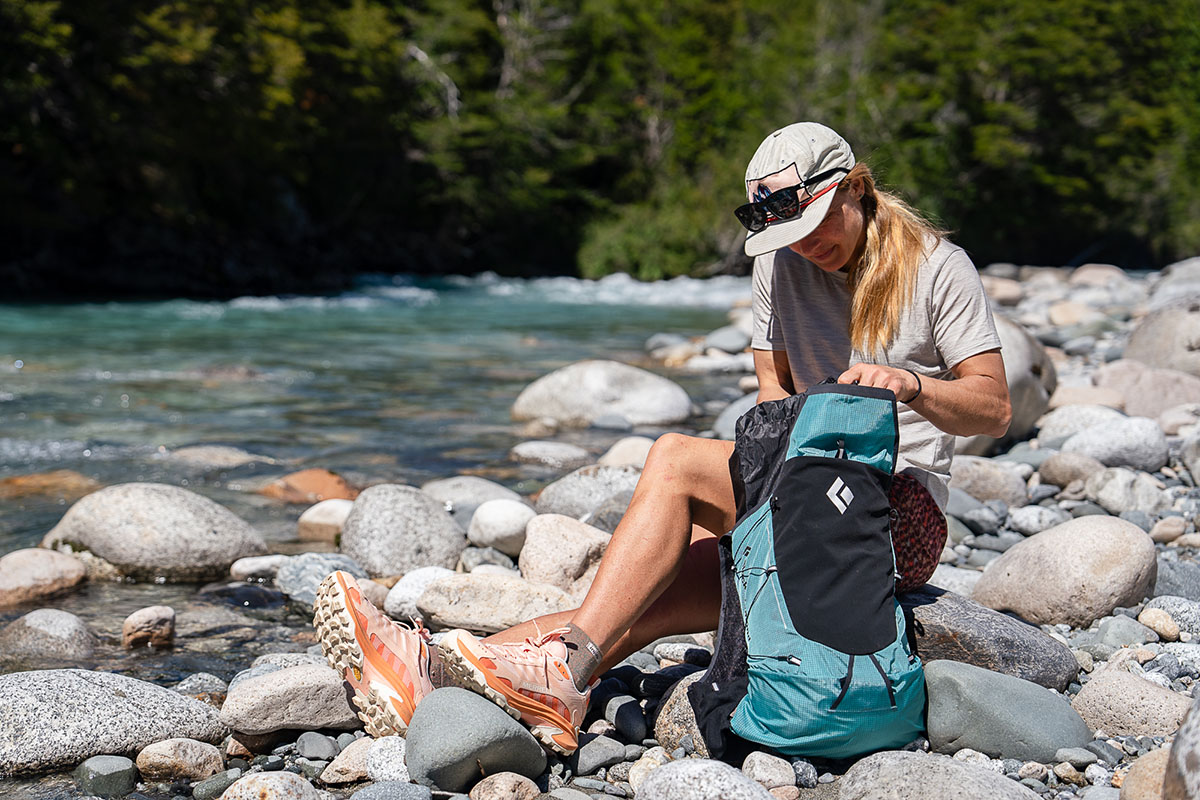
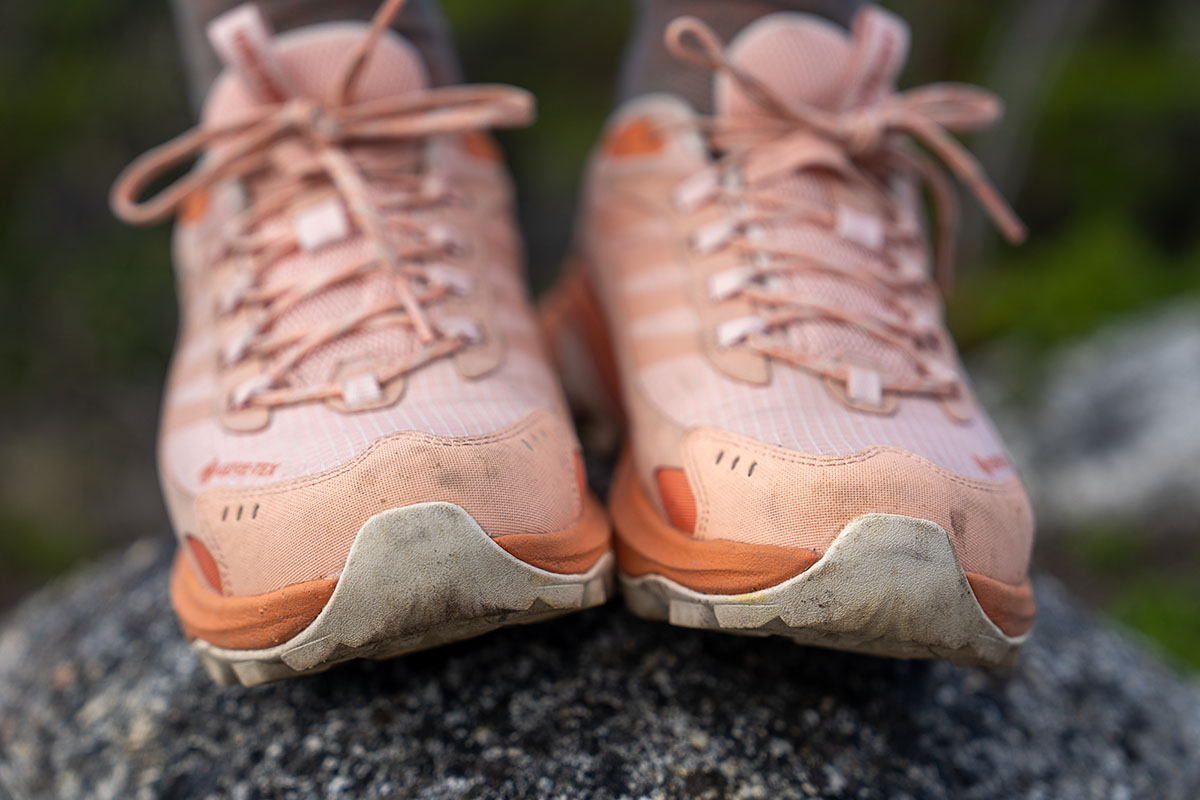
| Shoe | Price | Category | Weight | Waterproof | Upper |
|---|---|---|---|---|---|
| Merrell Moab Speed 2 GTX | $170 | Hiking shoe | 1 lb. 5.2 oz. | Yes (Gore-Tex) | Synthetic/TPU |
| Salomon X Ultra 5 GTX | $170 | Hiking shoe | 1 lb. 6.6 oz. | Yes (Gore-Tex) | Synthetic |
| Merrell Moab 3 Waterproof | $140 | Hiking shoe | 1 lb. 10.1 oz. | Yes (M-Select) | Leather/mesh |
| Danner Trail 2650 GTX | $190 | Hiking shoe | 1 lb. 5 oz. | Yes (Gore-Tex) | Leather |
| Hoka Speedgoat 6 | $155 | Trail runner | 1 lb. 0.4 oz. | No (available) | Mesh |
Merrell’s Moab Speed joins a popular and growing segment of the hiking shoe market, which aims to balance weight, cushioning, and support. One of the longstanding leaders in this space is Salomon's X Ultra line, and the X Ultra 5 GTX checks in around the same weight as the Moab Speed but with a step up in all-around trail performance. Specifically, it's a bit more planted with a stiffer platform, and you get additional protection with the full rubber toe cap. For putting in serious miles on the trail, we prefer the X Ultra, although its quick-pull lacing system is polarizing (it’s harder to customize tightness throughout the foot like you can with the Merrell).
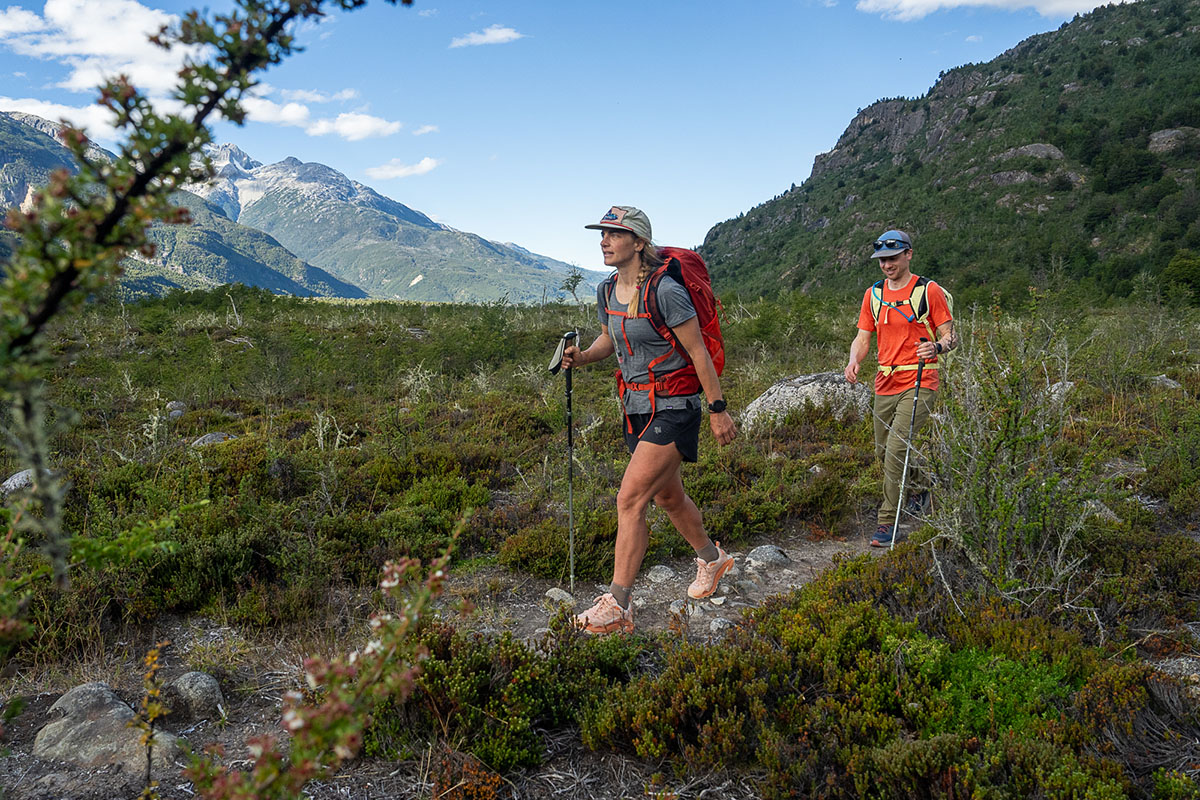
Merrell’s flagship Moab 3—the design off of which the Moab Speed is based—remains one of the most common shoes on the trail. However, despite sharing a similar name and relatively roomy toe boxes, the two Moabs fall on opposite ends of the market. Where the Moab 3 Waterproof is a classic design that emphasizes comfort and durability, the Moab Speed is lighter (by 4.9 oz. per pair) and noticeably nimbler but has a less protective synthetic build. A final decision between the two will likely come down to hiking priorities. For most day adventures, we prefer the trimmed-down Speed; for more demanding day missions and even on-trail backpacking, we’d go with the standard—and $30-cheaper—Moab (for more, see our in-depth review).
Another popular alternative to the Moab Speed is Danner’s Trail 2650 GTX. This light-and-fast shoe—its name refers to the length of the Pacific Crest Trail—impressed us with its comfort, low weight, sharp looks, and traction. Stacked up to the Merrell, the Danner is more expensive at $190, but you get nice upgrades in material quality, with a long-lasting leather upper and Vibram’s premium Megagrip outsole. It’s true that the Moab Speed is a bit more stable, but neither design is a great match for covering long stretches of technical terrain (especially with a heavy pack). In truth, both are solid day hiking options, and the Merrell’s advantage in value may give it the edge for some.
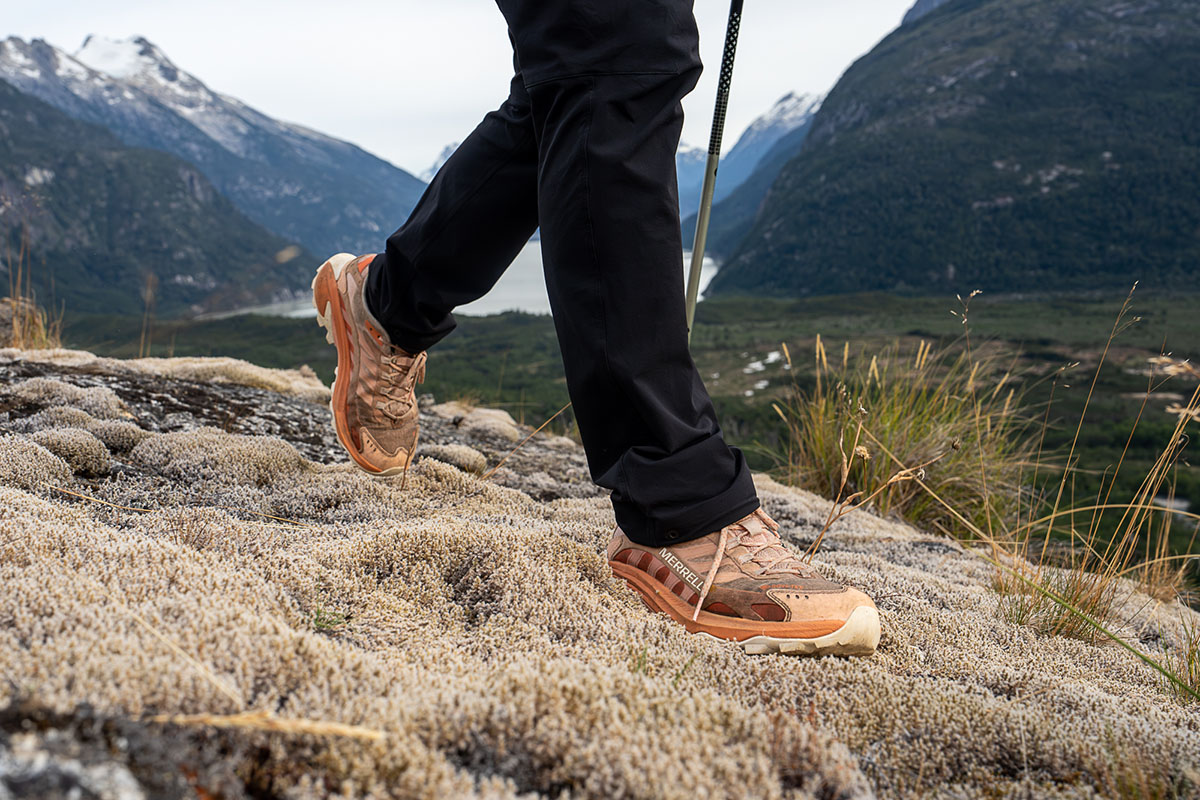
Finally, if you’re torn between going with a hiking shoe or a trail runner, the Hoka Speedgoat 6 is definitely worth a look. At almost 5 ounces lighter than the Moab Speed 2 GTX (it’s also offered in a waterproof Gore-Tex version for $170 and 1 lb. 2 oz.), the Speedgoat is a popular package of cushioning, grip (with a Vibram Megagrip sole), and durability that’s gained remarkable popularity among thru-hikers. For $15 less than the Moab, you get a nimbler feel and additional comfort for long days on the trail. But what you gain in cushion and flexibility, you lose in support: While the Speedgoat is notably stable for a running shoe, the Moab Speed offers a firmer, more planted feel on the trail for minimal added weight.
If you’re thinking about buying gear that we’ve reviewed on Switchback Travel, you can help support us in the process. Just click on any of the seller links above, and if you make a purchase, we receive a small percentage of the transaction. The cost of the product is the same to you but this helps us continue to test and write about outdoor gear. Thanks and we appreciate your support!
Depending on the seller, most products ship free in the United States on orders of $50 or more. International shipping availability and rates vary by seller. The pricing information on this page is updated hourly but we are not responsible for inaccuracies.